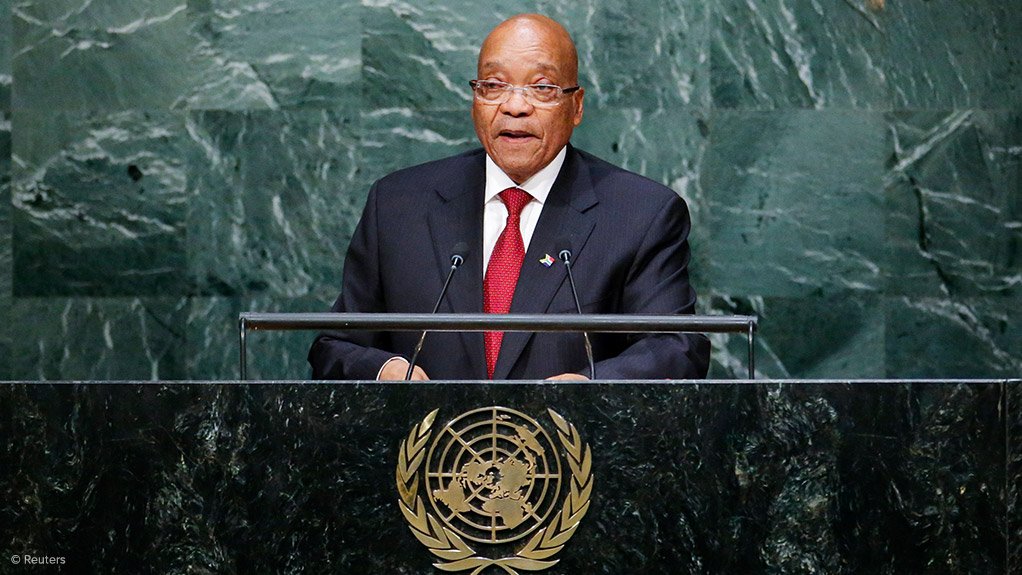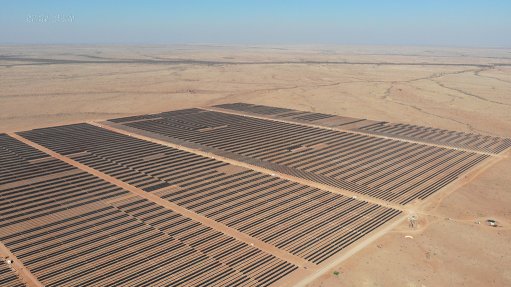Zuma warns illicit financial outflows hinder Africa’s development
President Jacob Zuma has warned that illicit financial flows out of Africa of about $50-billion a year were depriving the continent of much needed resources for development.
In a statement on Wednesday, the Presidency quoted Zuma as saying: “Illicit financial flows deprive developing countries of the much-needed economic resources to uplift their economies in order to provide infrastructure and basic services such as education and health care.”
Zuma made his remarks during his address at the United Nations (UN) General Assembly meeting in the US on Tuesday.
“The successful implementation of Africa’s development plans depends on the availability of resources. We are therefore seriously concerned about the loss of resources of the continent through illicit financial flows.”
The Joint African Union and UN Economic Commission for Africa’s High-level Panel on Illicit Financial Flows from Africa estimates that illicit flows from Africa could be about 50 billion dollars per annum.
Zuma said: “We committed ourselves to an ambitious and transformative global development programme that seeks to address the triple challenge of this century, which is Poverty, Unemployment and Inequality.”
He said to a great extent, the Millennium Development Goals played a critical role in galvanising governments and communities all over the world to put in place programmes and policies aimed at poverty eradication and in addressing socio-economic development, particularly in Africa.
“It is a well-known reality that our continent, particularly sub-Saharan Africa, did not achieve the targets that were set in the MDGs. It was for this reason that we insisted that the Sustainable Development Goals should continue the unfinished business of the MDGs,” said Zuma.
“We have an interest, therefore, in ensuring the full implementation of the SDGs, as we take forward the agenda of promoting Africa’s sustainable development.
“We have made significant strides in the past couple of decades in reversing the impact of underdevelopment and the legacies of Colonialism and Apartheid in Africa.”
Zuma said if Africa was to develop faster, “we need to address certain constraints”.
He said the constraints included inadequate infrastructure, high dependency on primary products, high exposure to commodity price volatility, limited investment in research and development, science, innovation and technology, low private sector investment and skills inadequacy.
“To respond to some of these constraints, the Continent has embarked on a number of initiatives. These include the New Partnership for Africa’s Development, the Presidential Infrastructure Championing Initiative, the African Mining Vision, and the Programme for the Infrastructural Development of Africa,” said Zuma.
He said South Africa had put in place a National Development Plan which was aligned to AU Agenda 2063, as well as the UN Sustainable Development Goals.
“At the core of our development plan is the focus on poverty eradication and the upliftment of the standard of living of our people,” said Zuma, who was one of the speakers on the opening day of the assembly.
“Our National Development Plan is also in line with the drive for industrialisation of Africa. This will contribute to the eradication of poverty, reduce inequality and unemployment, and will also contribute positively to global growth and prosperity.
“It is therefore imperative that Africa and the Least Developed Countries, which were left behind in previous industrialisation processes, must not be excluded from the 4th or New Industrial Revolution.”
Zuma said the African continent remained committed through the African Union and its Peace and Security Architecture to resolve the remaining conflict areas.
“We have committed ourselves to silence the guns by 2020.”
Zuma also appealed to the UN Security Council “in particular” to support African peace operations so that we can achieve this noble goal.
The situation in Libya, South Sudan and the Central African Republic remains a continental priority.
“We strongly urge the UN Security Council to better align and coordinate with the African Union in efforts to bring about peace in these sister countries and the continent at large.
“Beyond the continent, we remain concerned about threats of terrorism. Fifteen years after the September 11 terrorist attacks on the United States, international terrorism remains a challenge that no single country or region can successfully deal with.
“We have witnessed the rise of ISIS and are horrified by its brutal and senseless killings.”
Zuma said the conflicts in both Libya and Syria had provided a fertile ground for the terrorists to carry out their unjustified terrorist activities. He said the conflict in Syria had led to chaos in that country in under five years, with devastating effect on the stability of the region.
Zuma said the deadlock in the Security Council on the Syrian question exposed the “inherent structural dysfunction” of the 1945, post Second World War consensus.
“We must therefore, ask ourselves if the UN, and in particular the UN Security Council as currently configured, can fulfill its mandate in addressing the challenges of the twenty first century?
“The UN Security Council is supposed to act in our collective interest without being bogged down by domestic narrow interests of few states.”
Zuma said it was imperative and urgent that the United Nations, and in particular the Security Council, should be reformed.
“South Africa has been calling for, and we will continue to call for, the fundamental reform of the United Nation’s Security Council in order to ensure the representation of Africa,” said Zuma.
“One billion people cannot continue to be denied a voice in this manner.”
On the troubles in Israel, Zuma said the lack of progress in finding a durable solution to the Palestinian question and the Saharawi Arab Republic’s struggle for self-determination remain a major concern for us.
“It is important that the United Nations should carry out its historic mission in ensuring that the two longest outstanding decolonization and occupation issues are resolved once and for all, in fulfillment of the UN Charter objectives.”
Zuma said the signing of the Paris Agreement last year marked a historic moment in humanity’s resolve to minimize the impact of climate change and address the human contribution to it.
“I would like to take this opportunity to commend our Secretary-General, Mr Ban Ki Moon, for the extra-ordinary leadership that he provided since COP 15 in Copenhagen.”
Zuma said he remained unwavering in his commitment to see a legally binding agreement finally agreed to by all.
“The adoption of the Durban Platform for Enhanced Action during COP17 was a historic milestone and marked a turning point in the negotiation of a legally binding instrument. It provided a clear road map with targets and deadlines.”
Zuma said on behalf of the people and government of South Africa, he “would like to take this opportunity to salute the outgoing Secretary General of the UN, His Excellency Mr Ban Ki Moon, for the sterling and outstanding manner with which he steered the affairs of the organisation in the past decade.
“We wish His Excellency Ban Ki-moon well with his future endeavours.
“We are pleased that the UN General Assembly (UNGA) has, for the first time in the history of the UN, been at the centre of the process of finding a new Secretary General.
“We believe in a balanced and equal role between the two principal organs on the question of the selection of the Secretary General.”
Zuma suggested that the General Assembly as the most representative organ, representing all the aspirations of the peoples of the world, should be central in determining the right man or woman to lead the UN to the future.
He said the UNGA cannot be expected “to just rubber stamp” decisions of the Security Council.
Zuma said: “South Africa is particularly supportive of the proposal to limit the term of office of the Secretary General to a seven-year non-renewable term in order to allow him or her to work without being concerned about reappointment.
“South Africa looks forward to working with you and other Member States throughout this Session.”
Comments
Press Office
Announcements
What's On
Subscribe to improve your user experience...
Option 1 (equivalent of R125 a month):
Receive a weekly copy of Creamer Media's Engineering News & Mining Weekly magazine
(print copy for those in South Africa and e-magazine for those outside of South Africa)
Receive daily email newsletters
Access to full search results
Access archive of magazine back copies
Access to Projects in Progress
Access to ONE Research Report of your choice in PDF format
Option 2 (equivalent of R375 a month):
All benefits from Option 1
PLUS
Access to Creamer Media's Research Channel Africa for ALL Research Reports, in PDF format, on various industrial and mining sectors
including Electricity; Water; Energy Transition; Hydrogen; Roads, Rail and Ports; Coal; Gold; Platinum; Battery Metals; etc.
Already a subscriber?
Forgotten your password?
Receive weekly copy of Creamer Media's Engineering News & Mining Weekly magazine (print copy for those in South Africa and e-magazine for those outside of South Africa)
➕
Recieve daily email newsletters
➕
Access to full search results
➕
Access archive of magazine back copies
➕
Access to Projects in Progress
➕
Access to ONE Research Report of your choice in PDF format
RESEARCH CHANNEL AFRICA
R4500 (equivalent of R375 a month)
SUBSCRIBEAll benefits from Option 1
➕
Access to Creamer Media's Research Channel Africa for ALL Research Reports on various industrial and mining sectors, in PDF format, including on:
Electricity
➕
Water
➕
Energy Transition
➕
Hydrogen
➕
Roads, Rail and Ports
➕
Coal
➕
Gold
➕
Platinum
➕
Battery Metals
➕
etc.
Receive all benefits from Option 1 or Option 2 delivered to numerous people at your company
➕
Multiple User names and Passwords for simultaneous log-ins
➕
Intranet integration access to all in your organisation





















